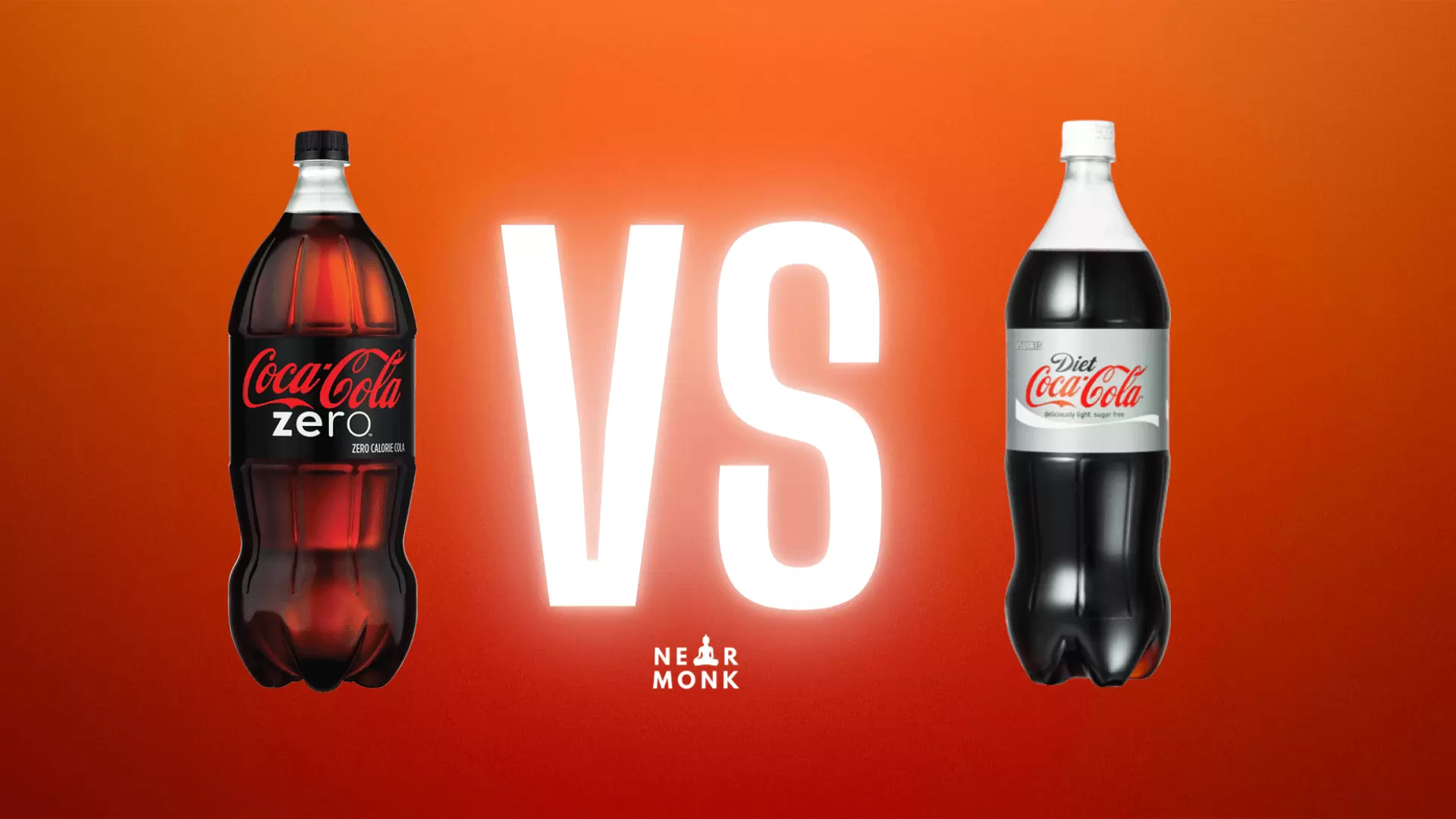You have probably heard that restricting the portion of added sugar in your diet is significant for your health. This article will help you to understand the multiple aspects of coke zero vs diet coke.
People who regularly drink sodas, may try swapping to sodas produced with artificial or non-nutritive sweeteners to lower their added sugar input.
These options make products taste sweet but do not direct the blood sugar boosts that conventional sugar may push.
ALSO READ - Eat Well, To Live Well – Importance of Healthy Eating
Diet drinks can avoid added sugars in drinks, but more lately, sodas with “zero” in their name have struck the market alongside them. Coca-Cola is a famous brand with “diet” and “zero” varieties.
Read on if you wonder about the contrasts between Coke Zero and Diet Coke and choose a better choice for yourself.
What is Coke Zero?
Coca‑Cola Zero Sugar is a sugar-free cola that seems and tastes even better like Coca-Cola’s original taste but without the sugar.
What is Diet Coke?
Diet Coke, Coca-Cola Light, or Coca-Cola Light Taste is a sugar-free and no-calorie soft drink made and distributed by the Coca-Cola Company. It has artificial sweeteners rather than sugar.
Are they Sweet?
Yes, Coke Zero Sugar is sweetened in our bottles and cans with a mix of aspartame and acesulfame potassium (or Ace-K). Together, they make a great taste with zero sugar and zero calories.
Diet Coke includes no added sugars since it uses artificial sweeteners instead. Regular Diet Coke uses aspartame, but you can also buy a variety of Diet Coke made with Splenda, a trademark of sucralose.
For context, one 12-ounce (355-mL) can of sugar-sweetened Coca-Cola Classic has 39 grams of carbs, whereas Coke Zero and Diet Coke have none.
How is Coke Zero different from Diet Coke?
These drinks are the same, especially regarding their main selling point: not having sugar. The key differences between Coke Zero and Diet Coke are:
Which Tastes Better?
One dubious disparity is the taste of these two beverages. Some declare they cannot taste a dissimilarity, while others claim Diet Coke or Coke Zero as tasting nearest the “real deal.”
ALSO READ : Don’t Start ABC Diet Without Reading These Important Facts
Both drinks are sugar-free and calorie-free. Coca‑Cola zero sugar appears and tastes more like Coca-Cola’s original taste, while Diet Coke has a distinct mix of flavors that provides a lighter taste.
Which One Is Healthier?
There are very few dissimilarities between Diet Coke and Coke Zero, and there is no concrete, measurable grounds to suggest that one is exemplary to the other.
Nutritionally, there are no marked differences, and their ingredient and caffeine ranges are similar, so neither is healthier than the other.
Coke Zero vs Diet Coke: Which Has More Calories?
- Diet Coke’s nutritional facts read 0 Calories, 0g Fat, 40mg Sodium, 0g Total Carbs, 0g Protein.
- Coca-Cola Zero’s nutritional facts read 0 Calories, 0g Fat, 40mg Sodium, 0g Total Carbs, 0g Protein.
Ingredients Listed – Coke Zero vs Diet Coke
Coke Zero’s ingredients include:
- carbonated water
- caramel color
- phosphoric acid
- aspartame
- potassium benzoate (to protect taste)
- natural flavors
- potassium citrate
- acesulfame potassium
- caffeine
It also includes phenylalanine’s amino acid, so people with phenylketonuria (PKU) should not devour it.
ALSO READ - Use Stress Toys – Play with your Stress
It comes in various flavors, including cherry, cherry vanilla, orange vanilla, and vanilla. Caffeine-free Coke Zero is also available.
Diet Coke’s ingredients include
- carbonated water
- caramel color
- aspartame
- phosphoric acid
- potassium benzoate (to protect taste)
- natural flavors
- citric acid
- caffeine
Diet Coke also includes phenylalanine’s amino acid, so patients with phenylketonuria (PKU) should avoid it.
Flavor combinations of Diet Coke have ginger lime and feisty cherry. Like Coke Zero, Diet Coke is also available in a caffeine-free version.
ALSO READ - A Complete Guide to Live a Healthy Lifestyle
While these drinks are pretty similar in ingredients, Diet Coke contains citric acid, while Coke Zero is made with sodium citrate.
What varies between the two is the type of sweetener they contain and their caffeine content, although these two differences are still doubtful to be necessary to most people.
The Sweetener Used in Coke Zero vs Diet Coke
Diet Coke utilizes aspartame as its sweetening agent. Coke Zero utilizes aspartame and acesulfame potassium, “Ace K” or “acesulfame K.”
Acesulfame potassium is another calorie-free sweetener that washes through the body without boosting blood sugar levels.
Which Has More Caffeine?
The other key difference is caffeine content, and Coke Zero has less caffeine than Diet Coke.
Which One Can Benefit Keto?
Coca-Cola Zero Sugar, or Coke Zero, aspires to recreate the taste of the actual Coca-Cola Classic without the sugar or calories.
It is prepared to imitate the distinctive Classic Coke flavor — unlike Diet Coke, which has a unique taste of its own.
If you observe the very low carb, high fat keto diet, you may wonder whether Coke Zero can be a portion of your ritual.
Maintaining ketosis on the keto diet
The keto diet seeks to reverse your metabolism into ketosis, a metabolic condition where your body burns fat rather than carbs for energy.
Thus, ketosis is achieved by consuming a very low-carb diet, including 20–50 grams of carbs per day and an increased fat intake.
ALSO READ : The Potato Diet – Everything Explained
Downing too many carbs on the keto diet can bring you out of ketosis and back into breaking down carbs for energy.
Coke Zero does not have carbs or calories, which means it likely will not hit you out of ketosis. Yet, since frequently drinking diet soda is connected to unfavorable health effects, water is the most suitable choice.
Hence concluded, Coke Zero has more little caffeine than Coke Zero, and it also uses an added sweetener, acesulfame potassium, that Coke Zero does not.
Overall, their ingredient ranges and nutritional profiles are exact.
Will Coke Zero and Diet Coke Make You Gain Weight?
.It appears to dispute the laws of physics. Regular sodas are rich in calories, 140 per drink and more, and diet sodas include zero calories.
ALSO READ - Start Gaining Weight With The Weight Gainers
So it seems rational that substituting one with the other should support you losing weight or staying the same weight. But no–several analyses have verified that drinking diet soda is associated with the weight increase. The following mechanism will help you understand why this happens.
It drives our bodies to make insulin
Insulin, secreted by the pancreas, is how the human body stocks sugar. When the flavor of artificial sweeteners (in soda, yogurt, or anything else) strikes your brain, it automatically transmits a signal to your pancreas to start making insulin.
Insulin informs our cells to either benefit from sugar or reserves it as fat.
Without it, our bodies cannot process the sugar that anchors in our bloodstreams. When your pancreas makes insulin to deal with regular sugar, no sugar comes, and it mistakes your body and disrupts its metabolic function.
This body reaction may clarify why several analyses have displayed a link between regularly sipping diet soda and metabolic syndrome, a cluster of symptoms that contains a larger waist rim, more elevated blood pressure, and more high blood sugar.
It prepares our taste buds for sweetness
You likely know that the more regularly you taste something (sweetness, saltiness, etc.), the more accustomed to it you become. This phenomenon is why somebody who stops consuming sugar or salt finds many commercially available foods overly salty (potato chips, for example) or too sweet (candy bars).
So it is worth thinking that artificial sweeteners are dramatically sweeter than sugar. Although it may not report that way on your tongue, diet soda is, in fact, considerably sweeter than typical soda.
All that sweetness escorted by zero calories mistakes your brain and your metabolic processes and tends to flee you craving sugar more than before.
It pushes you to feel entitled to devour more
Calculating calories is yet the most typical strategy people use to lose weight, and it is the code behind both weight watchers and those who want to lose weight!
If you count calories, there is an easy equation: Sipping regular soda points, you have to eat 140 calories narrower than something else that day.
Consuming a diet soda suggests you have devoured zero calories, so you get free access to feast more. But since sipping the diet soda has tricked your body into desiring sugar, it has altered the way you metabolize those additional calories.
You may accumulate more of them as fat and utilize fewer of them as energy, which could make you hungry and desire even more food.
Side Effects of Drinking Too Much Coke Zero or Diet Coke
Studies have listed the adverse effect:
- Could disrupt gut healthiness.
- Erodes tooth enamel.
- Could lessen bone density.
- May impact heart health.
- It might be associated with sugar cravings.
- Might be linked to weight gain.
- It may be related to type 2 diabetes.
The Bottom Line
Analysis of Diet Coke and Zero Coke has assembled many conflicting pieces of evidence.
One basis for this conflicting knowledge is that most study is observational. The studies observed trends, but there is a lack of facts about whether diet coke or zero coke intake is a reason or associated with the actual cause.
Thus, while some of the research rings quite alarming, more high-quality experimental examinations are needed before drawing concrete conclusions about the health effects of the varieties of these coke.
Still, one thing is sure: Diet coke and Zero coke soda do not add any nutritional value to your diet.
So, if you are looking to substitute regular coke in your diet, other choices may be more reasonable than diet or zero coke. You can also try milk, coffee, black or herbal tea, or fruit-infused water.
Professional Disclaimer : The Site cannot and does not contain medical/health advice. The medical/health information is provided for general informational and educational purposes only and is not a substitute for professional advice. Accordingly, before taking any actions based upon such information, we encourage you to consult with the appropriate professionals. We do not provide any kind of medical/health advice. THE USE OR RELIANCE OF ANY INFORMATION CONTAINED ON THE SITE IS SOLELY AT YOUR OWN RISK. This site is protected by reCAPTCHA and the Google Privacy Policy and Terms of Service apply.
Nearmonk.com is a participant in the Amazon Services LLC Associates Program, an affiliate advertising program designed to provide a means for sites to earn advertising fees by advertising and linking to Amazon.com. We may earn a small commission for our endorsement, recommendation, testimonial, and/or link to any products or services from this website.



